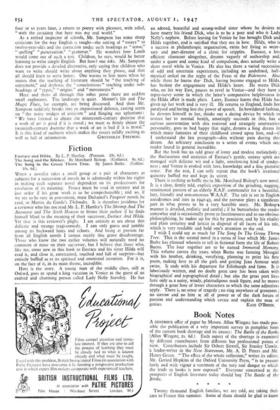Fiction
Eustace and Hilda. By L. P. Hartley. (Putnam. 10s. 6d.) • WHEN a novelist takes a small group or a pair of characters as subjects for a succession of novels he is admittedly within his rights in making each separate novel dependent on its predecessors for revelation of its meaning. Proust must be read in entirety and in just order if his great work is to be comprehensible ; and so, if we are to be sure in assessment, must Duhamel's Pasquier novels be lead, or Martin du Garde's Thibaults. It is therefore invidious for a reviewer who has not read Mr. L. P. Hartley's The Shrimp And The Anemone and The Sixth Heaven to blame their author if he finds himself blind to the meaning of their successor, Eustace And Hilda. Yet that is this reviewer's plight. I am entirely at sea about this delicate and strange tragi-comedy. I can only guess and jumble among its backward hints and echoes. And being at present far from all English novels I cannot rectify this grave disadvantage. Those who know the two earlier volumes will naturally need no comment of mine on their successor, but I believe that those who, like me, come new in this book to Eustace and his sister Hilda will read it, and close it, entertained, touched and full of surprise—but entirely baffled as to its spiritual and emotional intention. For it is, on the face of it, in its main theme, incredible.
Here is the story. A young man of the middle class, still at Oxford, goes to spend a long vacation in Venice as the guest of an exalted and charming person called Lady Nelly Staveley. He has an adored, beautiful and strong-willed sister whom he desires to have marry his friend Dick, who is to be a peer and who is Lady Nelly's nephew. Before leaving for Venice he has brought Dick and Hilda together, and is satisfied that they are in love. Hilda, who is a success in philanthropic organisation, earns her living as secre- tary. and part-director of a clinic for cripples. Eustace, a less efficient character' altogether, dreams vaguely of authorship and, under a queer and comic kind of compulsion, does actually write a short novel while in Venice. He also has there a varied succession of odd and uncertain experiences, including •an undefined, half- mystical ordeal on the night of the Feast of the Ridentore. Also while there he learns that• Dick, having become engaged to Hilda, has broken the engagement and Hilda's heart. He meets Dick who, on his way East, pauses to revel in Venice—and they have a topsy-turvy scene in which the latter's comparative helplessness in the Hilda affair is made plain. Later, Eustace learns that Hilda has given up her work and is very ill. Re returns to England, finds her paralysed and having loSt the power of speech. In bewildered fashion, he devotes himself, to her, thinks out a daring device by which to restore her to normal health, amazingly succeeds in this, has a curious conversation with this restored and strangely unattractive personality, goes to bed happy that night, dreams a long dream in which many fantasies of their childhood crowd upon him, and—if I understand the last paragraph—dies without pain during this dream. An arbitrary conclusion to a series of events which one reader found in general incredible.
But the book has an .odd grace of irony and modest melancholy ; the fluctuations and anxieties of Eustace's gentle, uneasy spirit are managed with delicate wit and a light, unrelenting kind of tender- ness ; and Venice is evoked with love, knowledge and a fine pictorial sense. For the rest, I can only repeat that the book's irrational quixotry baffled me and kept its secret.
There is nothing to baffle me in Mr. Morchard Bishop's new novel. It is a clear, firmly told, explicit exposition of the grinding, nagging, sentimental passion of an elderly R.A.F. commander for a beautiful, lazy, friendly and non-amorous W.A.A.F. The tale is set in English aerodromes and inns in 1942-43, and the narrator plays a significant part in what proves to be a very horrible story. Mr. Bishop-a manner is detailed, realistic and careful ; if he buttonholes the reader somewhat and is occasionally prone to facetiousness and to too obvious philosophising, he makes up for this by precision, and by his vitality and plain certainty and justice in disposal of all facets of his tale, which is very readable and hold one's attention to the end.
I wiih I. could say as much for The Song In The Green Thorn Tree. This is the second novel in a series of four which Mr. James Barke has planned wherein to tell in fictional form the life of Robert Burns. The four together are to be named Immortal Memory. This volume covers the years when Burns was farming Mossgiel with his brother, drinking, versifying, planning to print his first poem, making love to all the girls and getting Jean Armour with twins. It ends with his departure for Edinburgh and fame. It is laboriously written, and no doubt great care has been taken with biographical and topographical detail ; but alas the great poet lives here only as a noisy, windy, platitudinous stock figure, and he moves through a great host of lesser characters to which the same adjectives apply. There is no sense of tragedy ; no ring anywhere of greatness ; no sorrow and no hint at all of power or of the dark forces of passion and understanding which create and explain the man of


































 Previous page
Previous page